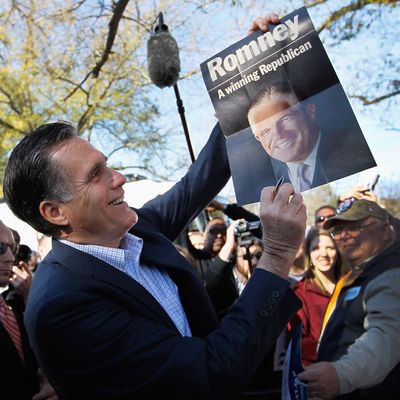
I have a review essay at my alma mater, the New Republic, about the tragedy of the moderate Republican. My argument is that moderation has ceased to exert any meaningful influence within the party. It exists, but as a kind of secret creed — positions and arguments that are hinted at publicly, or articulated behind closed doors, but which exert no open influence within a party in which increasingly stringent conservatism has gained a monopoly on legitimate public discourse.
One section of the review concerns the dilemma this poses for moderate conservative intellectuals. On the one hand, moderates like David Frum, Josh Barro, and Bruce Bartlett have come out squarely against the party’s radical turn. On the other, those like Michael Gerson, David Brooks, and Ross Douthat desperately want a more moderate party but persist in a state of denial about the prospects of this happening in the face of deepening radicalism. Douthat is an especially important figure in the piece, as he is an unusually intelligent analyst and unusually engaged with the moral arguments of conservatism’s critics. But the combination of these traits, along with his very understandable attachment to the Republican party (understandable, given his deep social conservatism and abhorrence of abortion) leave him endlessly in search of false dawns of Republican moderation.
His most recent column, conveniently for the timing of my review, offers a classic example. Douthat posits that Romney may have, in the course of his first debate, redefined the Republican party in a more centrist and economically populist image.
What Romney executed on Wednesday night was not just a simple pivot to the center, as much of the post-debate analysis suggested. Pivot he certainly did — stressing bipartisanship and touting his record as the moderate governor of a liberal state, backing away from the more implausible spending cuts implied by his budget promises, and explicitly breaking with the idea that upper-bracket tax cuts can be a self-financing free lunch.
But this wasn’t some sort of Sister Souljah moment, where Romney called out his fellow conservatives in order to curry favor with the center. Rather, what he did was clarify, elevate, and translate. He clarified what kind of tax reformer he would be, by promising that revenue neutrality would take priority over sweeping cuts for the rich — a premise that plenty of Republicans are already happy to accept. He elevated an argument that’s increasingly popular among conservative wonks — that the Dodd-Frank financial reform perpetuates “too big to fail” — and used it to make a populist case against the president.
While I don’t share Douthat’s preference that Romney win the election, if he does win, I would very much like his hopes for a reform GOP to come true. But there is literally nothing in Romney’s platform to support this interpretation. Go over to Romney’s web site and check out his tax plan:
America’s individual tax code applies relatively high marginal tax rates on a narrow tax base. Those high rates discourage work and entrepreneurship, as well as savings and investment. With 54 percent of private sector workers employed outside of corporations, individual rates also define the incentives for job-creating businesses. Lower marginal tax rates secure for all Americans the economic gains from tax reform.
• Make permanent, across-the-board 20 percent cut in marginal rates
• Maintain current tax rates on interest, dividends, and capital gains
• Eliminate taxes for taxpayers with AGI below $200,000 on interest, dividends, and capital gains
• Eliminate the Death Tax
• Repeal the Alternative Minimum Tax (AMT)
That’s just a really big tax-rate cut, accompanied by vague promises of reform. Romney didn’t back off his promise of rate cuts. He simply asserted it wouldn’t cut taxes for the rich, which is false. (His own campaign is arguing that Romney’s plan would cut taxes for the rich, but could avoid increasing the deficit through a combination of higher growth and counting the saving from health care repeal against the costs.)
How about Wall Street regulation? Romney’s position has always been that he’ll repeal Dodd-Frank, which has made him incredibly popular on Wall Street. He has never said what he would replace it with. It would be pretty odd if Romney planned to replace Dodd-Frank with something much worse for Wall Street, since such a plan would, whatever its costs to his fund-raising, have been the absolute golden ticket for his election campaign.
But there’s a reason the Republican party has coalesced around policies like maximal tax cuts for the rich and minimal regulation on the finance industry. There are powerful constituencies for them. If Romney had the ability to shaft those constituencies and advocate a populist reform that would establish him as an un-Bush-like moderate, he would probably do it before the election. Bill Clinton didn’t spring welfare reform and a crime bill on his base after he won. He used them to help win.
Now, it is true that Romney could simply abandon his tax proposal, and he could replace Dodd-Frank with some tougher plan to break up Wall Street. It is impossible to disprove a prediction about the future. But none of those constituencies are even remotely alarmed at Romney’s debate rhetoric. One possibility is that their communication with Romney assures them they have nothing to worry about and are happy to have Romney make empty or misleading rhetorical gestures to win the election, just as George W. Bush did. The other possibility is that they are blissfully unaware that they are walking into a devastating betrayal. I know which interpretation strikes me as more plausible.






























